The AMD 3rd Gen Ryzen Deep Dive Review: 3700X and 3900X Raising The Bar
by Andrei Frumusanu & Gavin Bonshor on July 7, 2019 9:00 AM EST** = Old results marked were performed with the original BIOS & boost behaviour as published on 7/7.
Benchmarking Performance: CPU Office Tests
The Office test suite is designed to focus around more industry standard tests that focus on office workflows, system meetings, some synthetics, but we also bundle compiler performance in with this section. For users that have to evaluate hardware in general, these are usually the benchmarks that most consider.
All of our benchmark results can also be found in our benchmark engine, Bench.
PCMark 10: Industry Standard System Profiler
Futuremark, now known as UL, has developed benchmarks that have become industry standards for around two decades. The latest complete system test suite is PCMark 10, upgrading over PCMark 8 with updated tests and more OpenCL invested into use cases such as video streaming.
PCMark splits its scores into about 14 different areas, including application startup, web, spreadsheets, photo editing, rendering, video conferencing, and physics. We post all of these numbers in our benchmark database, Bench, however the key metric for the review is the overall score.
We're investigating the PCMark results, which seem abnormally high.
Update: We can't do a direct comparison due to the lack of a RX460 for PCMark for the moment
3DMark Physics: In-Game Physics Compute
Alongside PCMark is 3DMark, Futuremark’s (UL’s) gaming test suite. Each gaming tests consists of one or two GPU heavy scenes, along with a physics test that is indicative of when the test was written and the platform it is aimed at. The main overriding tests, in order of complexity, are Ice Storm, Cloud Gate, Sky Diver, Fire Strike, and Time Spy.
Some of the subtests offer variants, such as Ice Storm Unlimited, which is aimed at mobile platforms with an off-screen rendering, or Fire Strike Ultra which is aimed at high-end 4K systems with lots of the added features turned on. Time Spy also currently has an AVX-512 mode (which we may be using in the future).
For our tests, we report in Bench the results from every physics test, but for the sake of the review we keep it to the most demanding of each scene: Ice Storm Unlimited, Cloud Gate, Sky Diver, Fire Strike Ultra, and Time Spy.
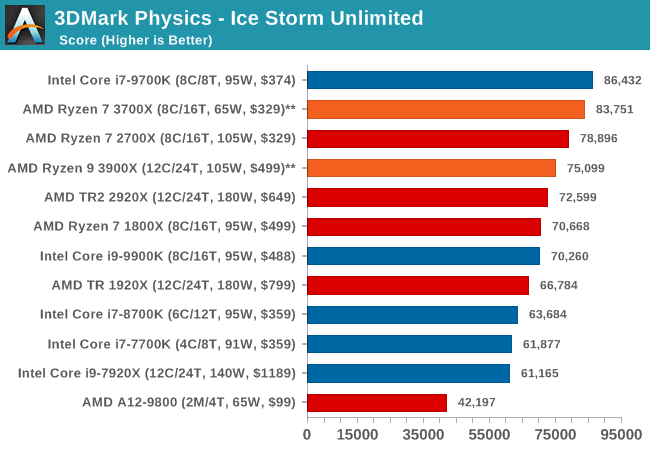
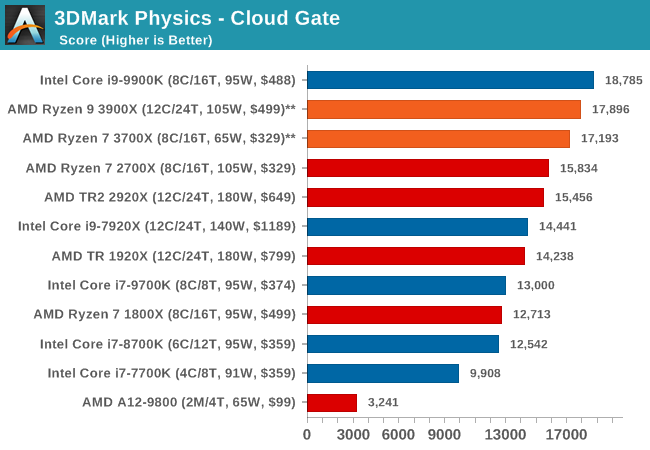
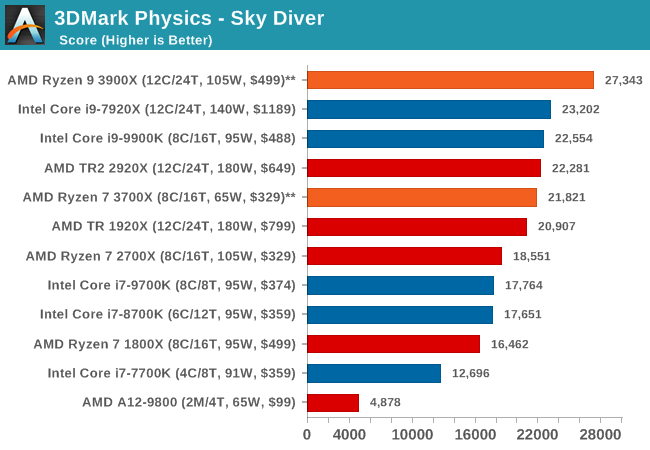
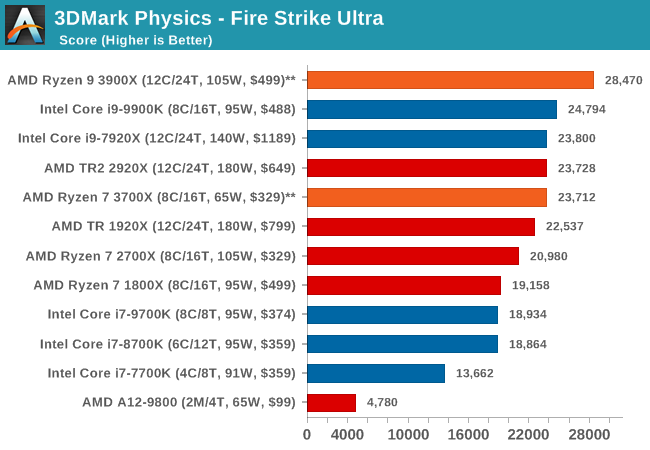
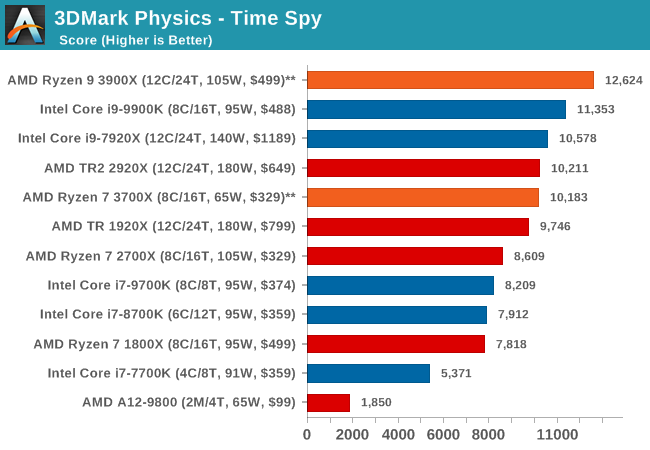
The older Ice Storm test didn't much like the Core i9-9900K, pushing it back behind the R7 1800X. For the more modern tests focused on PCs, the 9900K wins out. The lack of HT is hurting the other two parts.
GeekBench4: Synthetics
A common tool for cross-platform testing between mobile, PC, and Mac, GeekBench 4 is an ultimate exercise in synthetic testing across a range of algorithms looking for peak throughput. Tests include encryption, compression, fast Fourier transform, memory operations, n-body physics, matrix operations, histogram manipulation, and HTML parsing.
I’m including this test due to popular demand, although the results do come across as overly synthetic, and a lot of users often put a lot of weight behind the test due to the fact that it is compiled across different platforms (although with different compilers).
We record the main subtest scores (Crypto, Integer, Floating Point, Memory) in our benchmark database, but for the review we post the overall single and multi-threaded results.
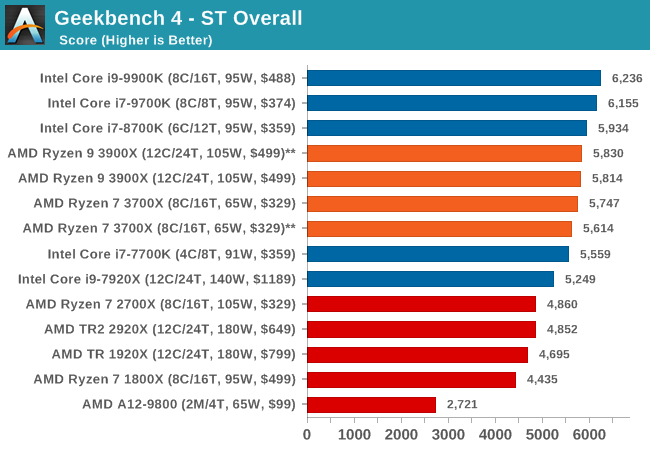
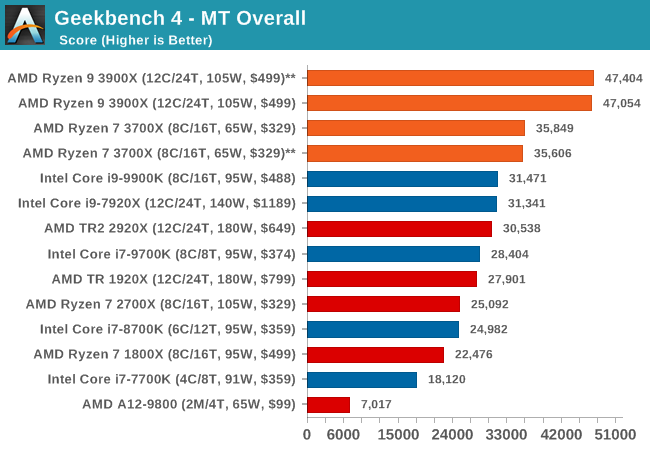










447 Comments
View All Comments
Korguz - Monday, July 8, 2019 - link
huh ???mkozakewich - Saturday, July 13, 2019 - link
"...as unfortunately the timing didn’t work out."You should increase his voltage a little and reboot, that might help.
Meteor2 - Monday, July 15, 2019 - link
It's hard to get one's head around this, but basically: *all* the Intel benchmarks *do not* include the security patches for the MDS-class flaws. The 9000 and 8000 series tests do include the OS-side Spectre fixes, but that's it. No OS-fixes for other CPUs, and no motherboard firmware fixes for any Intel CPUsAt the very least, all the Intel CPUs should be retested on Windows 10 1903 which has the OS-side MDS fixes.
Most if not all the motherboards used for the Intel reviews can also have their firmware upgraded to fix Spectre and most times MDS flaws. Do it.
This is sensible and reasonable to do: no sensible and reasonable user would leave their OS vulnerable. Maybe the motherboard, because it's a bit scary to do, but as that can be patched, it should be by reviewers.
This would result in all the Intel scores being lower. We don't know by how much without this process actually being done. But until it is, the Intel results, and thus the review itself, are invalid.
While you're at it Anandtech, each year buy the latest $999 GPU for CPU testing. Consider it a cost of doing business. Letting the GPU bottleneck the CPU on most game resolutions benchmarked is pointless.
plonk420 - Sunday, July 7, 2019 - link
mountain time zone, best time zone... 7am 7/7!exactopposite - Sunday, July 7, 2019 - link
Been waiting on this one for a long timeEris_Floralia - Sunday, July 7, 2019 - link
It's really nice to see Andrei starting to take part in desktop processor reviews and Gavin Bonshor's hardwork!mjz_5 - Sunday, July 7, 2019 - link
Intel gets 5% better FPS In games is really not a win. I’ll consider that a tie. In multiple applications AMD gets 20% more performance. That’s a win!!Dragonstongue - Sunday, July 7, 2019 - link
hopefully Anal lists :P see how much a "win" the Ryzen 3k / x5xx / Navi truly are, not only to get AMD margins even higher but to take more market share from Intel and "stagnate" Nvidia's needing to "up the price" to make more $$$$$$ when AMD "seems" to be making "as much if not more" selling a small amount less per unit (keep in mind, AMD is next Playstation and Xbox which are 99/9% likely to be using the same silicon, so, AMD take a "small hit" to get as many Ryzen gen 3 and Navi "in the world" which drums up market/mindshare which is extremely important for any business, at this stage in the game is VITAL for AMD.sor - Sunday, July 7, 2019 - link
I’m honestly wondering what the point is of the gaming benchmarks for CPU tests anymore.It seems like the game is either so easy to render that we are comparing values in the hundreds of FPS, or they’re so hard to render that it’s completely GPU dependent and the graph is flat for all CPUs.
In the vast majority of tests here one would have an identical experience with any of the top four CPUs tested.
Targon - Monday, July 8, 2019 - link
Game engines are starting to use more cores, and at lower resolutions(which do not stress the video card all that much) will show improvements/benefits of using one CPU or even platform over another. In this review, due to the RAM being used, the gaming benchmarks are almost invalid(DDR4-3200 CL16), since moving to CL14 RAM would potentially eliminate any advantage Intel has in these benchmarks.